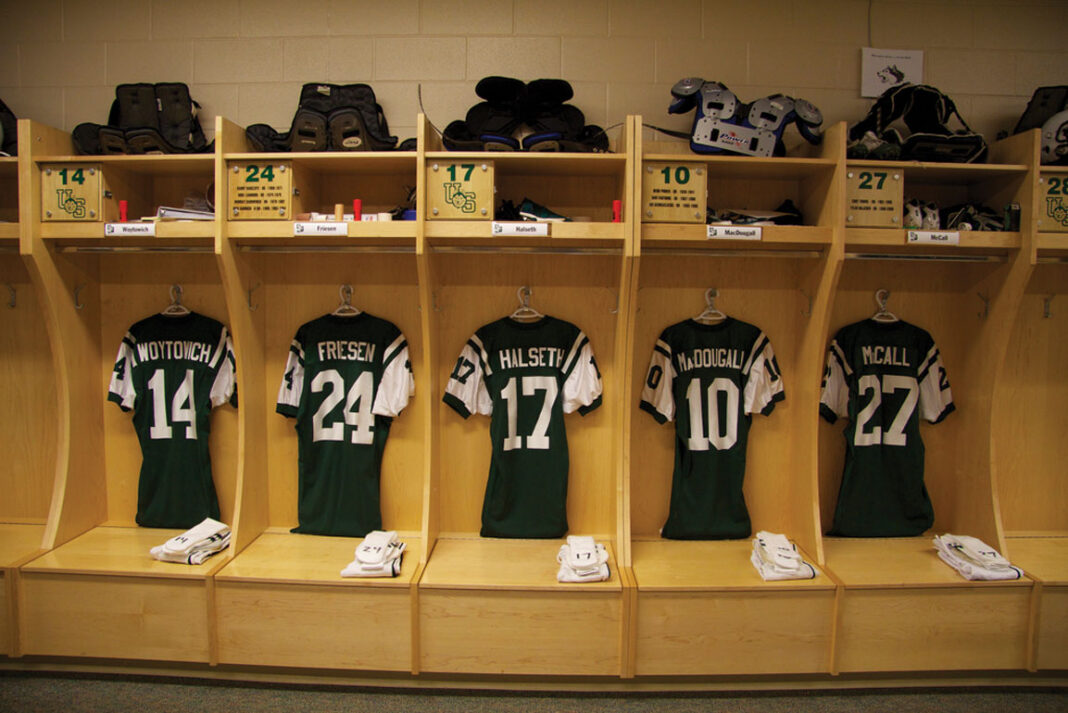
By: Clare Jenkins
When sports fans think of what is commonly referred to as “locker room talk” they may think of testosterone fueled men boasting about the women they’ve slept with.
And apparently President-elect Donald Trump thinks the same and some.
A video of Trump describing a time he tried to seduce a married woman resurfaced in October featuring Trump boasting about how he can use his fame to sexually prey on women.
“When you’re a star they let you do it. You can do anything. Grab ‘em by the p***y. You can do anything,” Trump said in the video.
Trump apologized, dismissing what he said as “locker room banter, a private conversation that took place many years ago.”
Trump has used the “locker room talk” defense five times including when he was questioned during the second presidential debate.
“Yes, I’m very embarrassed by it. I hate it. But it’s locker room talk, and it’s one of those things,” he said.
Trump’s passing off talking about sexual assault as locker room banter has stirred up questions about what really goes on when athletes get together behind closed doors.
“As an athlete, I’ve been in locker rooms my entire adult life and uh, that’s not locker room talk,” Oakland Athletics pitcher Sean Doolittle tweeted.
John Amaechi, former NBA player told the guardian: “I’ve had more conversations about politics, about racism and the tax advantages of living in Florida than I have conversations that even approached what Donald Trump said.”Amaechi did say that the locker room is an environment where potentially offensive things are said behind closed doors.
“Although I’ve also heard people use words for women that I would not approve of or use, I’ve never heard anybody in a locker room speak of a non-consensual sexual act,” he told The Guardian. He also credits the locker room as “one of the last bastions of straight male intimacy.
“[It is] one of the last places men can cry, can touch each other, where they can emotionally connect,” he said.
However supportive, former University of Toronto rugby player, Dallas Blackstone describes the locker room as a place where there is a constant assertion of masculinity. “I think it’s got a lot to do with the fact that men are uncomfortable being naked together and they need to reassert their heteronormativity,” Blackstone said.
“But that’s not locker room talk. That’s misogyny,” he said referring to Trump’s words in the video. Blackstone said locker room talk isn’t what Trump said about describing sexual assault. Often times it’s describing consensual sex. “It’s a bit of boasting, a bit of private stuff but no one talks about rape,” he said.
Though Blackstone also said it can be a place of healthy and supportive sexual discussion. “I think sexuality is an important thing to talk about and I think you should openly discuss things like intimacies as long as you’re not defaming.”
“I think it’s a real reflection of how the new paradigm of feminism needs to be taught to our boys. It’s not about women covering themselves up; it’s about men realizing that a woman exposing some of her bust isn’t an invitation,” he said.
Seneca’s Athletic Director, Linda Stapleton, would agree. She said that one of the initiatives Seneca College has taken to decrease sexual assault comes after the Ontario government passed new sexual violence legislation mandating that all Ontario colleges and universities create separate sexual assault policies by January 2017.
Seneca has taken a huge approach to educate athletes and staff about the impact of words and actions. The college developed a clinic for all staff and students to talk about sexual assault and appropriate language.
“What used to be considered locker room talk has no place in the college or the locker room and no place in our lives,” Stapleton said. Stapleton said student athletes are holding each other accountable. “They say ‘remember, we talked about that. You shouldn’t be saying that.”
“What Trump said was not acceptable, ” she said. “It’s not locker room talk, it’s sexual abuse. It’s demeaning and it’s disgusting,” she said.
Manager of athletics at Fanshawe College Nathan McFadden said what Trump said certainly does not qualify as locker room talk. “He has mischaracterized this term and obviously doesn’t have any sports background,” McFadden said.
“Trump was disrespecting women. It is something that in my 20 plus years of being in sport I haven’t come across professionally or as an amateur,” he said.
Georgian College’s Athletic Director Michele McConney, said she sees the locker room as a positive space for athletes to prepare for a game. “Athletes can come to our athletic centre and leave those negative feelings at the door, come in, change and leave with a good mindset,” she said.
“Some athletes have their headphones on and prepare to themselves, others are in chatting and preparing for the game. I see it as a good mental de-stresser zone.”
Fraser McKeown plays for Humber College’s men’s hockey team and said locker room chat is generally not as sexual as people imagine it to be.
“Most conversations aren’t as bad as you can imagine. They usually aren’t things you would want your Mom to hear, but aren’t as terrible as you think.”
McKeown compared Trump to what he calls “‘That Guy’. I’m sure everybody has experienced a guy who does things just for the story, and just to show off to the guys. But those guys are few and far between. They are also not the players who are very popular with the guys because we understand that it’s an act, and that they are just trying too hard,” he said.

